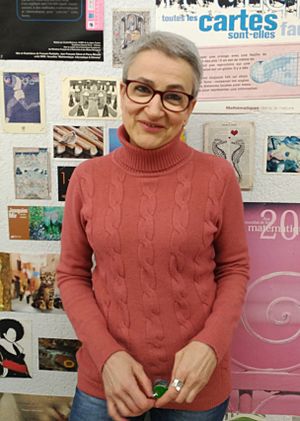Marta Macho Stadler facts for kids
Quick facts for kids
Marta Macho Stadler
|
|
|---|---|
 |
|
| Born |
Marta Macho Stadler
9 September 1962 Bilbao, Spain
|
| Nationality | Spanish |
| Scientific career | |
| Fields | Mathematics |
Marta Macho Stadler was born in Bilbao, Spain, in 1962. She is a mathematician from the Basque Country. She is very good at sharing science with everyone. Marta teaches math at the University of the Basque Country UPV/EHU. Her special area of study is called the Geometric Theory of Foliations. She also leads a popular online blog called Mujeres con Ciencia (Women with Science). This blog is part of the Scientific Culture Chair at her university. She has won many awards, including the Emakunde Equality Prize in 2006.
Contents
Marta's Journey in Mathematics
Marta Macho Stadler earned her degree in mathematics in 1985. She studied at the University of the Basque Country. Soon after, she started teaching math at the same university. In 1987, she went to the University Claude Bernard in Lyon, France. There, she worked with Professor Gilbert Hector. She finished her Ph.D. in 1996. Her research was about a complex math topic called "Thom isomorphism for foliation almost without holonomy." Today, she is an associate professor. She teaches geometry and topology at the UPV/EHU. Her main research area is the geometric theory of foliations.
Marta teaches different math subjects to university students. These include topology and advanced topology. She also teaches a special class called "Mathematics in daily life." This class helps people see how math is used all around us. She also helps students who are studying for their master's degrees in math.
Sharing Science and Supporting Women
Marta started sharing science with the public in 1999. She helped organize a series of talks called "A stroll through geometry." This event ran for 10 school years. One of her biggest goals is to show how much women have contributed to science.
Marta is part of the Women's Commission. This group belongs to the Royal Spanish Mathematical Society (RSME). She also helps with many activities. These activities connect science with everyday people.
She is very interested in how math appears in books and plays. She studies how scientific ideas and math structures are used in novels, comics, and poetry. She writes for the "Literature and Mathematics" section. She also writes for the "Theatre and Mathematics" section. These are part of DivulgaMAT, a project by the RSME. She has worked with cultural groups and schools. Her goal is to get students and others excited about science. She has also written for blogs like ZTFNews.org and Cuaderno de cultura científica. She organizes an event each year called "Ellas hacen ciencia" ("They make science"). This event takes place in Bilbao.
Since 2010, Marta has been part of the Parity Commission. This group works for fairness at the University of the Basque Country. In 2015, she joined the Cooperation Council at the same university. She has also been a member of the Female Researchers and Technologists Association (AMIT) since 2011.
In May 2014, she started an online space called "Women with science." This blog is part of the Scientific Culture Chair at the University of the Basque Country. Marta is the main editor of this blog. The blog's goal is to highlight the work of women in science. It shows the important contributions of women from the past and present. It also talks about topics like science and gender equality.
In 2015, she won the Equality Prize from the Universidad de Alicante. She received it for sharing science with others. She also won for helping to make women's scientific achievements visible. These achievements help society grow. She also received a medal from the Royal Spanish Mathematical Society. This was for her work in sharing math. It was also for her commitment to gender equality. She helped connect math teachers with different ways of learning.
In November 2016, she received the Emakunde Equality Prize. This award recognized her excellent work in sharing science. It also honored her efforts to promote women's scientific knowledge. This included looking at things from a gender perspective. She also worked on science and education groups. These groups helped promote gender equality at the university. She donated the money from this award. It went to refugee women and victims of gender violence. These women were studying at the University of the Basque Country.
Marta is also a co-author of a book. It is called Mujeres en la Ciencia (Women in Science). This book is a guide for teachers. It shows the role of women throughout the history of science.
Awards and Recognition
Marta Macho Stadler has received many important awards for her work:
- 2015 Equality prize from the Universidad de Alicante.
- 2015 Medal from the Royal Spanish Mathematical Society.
- 2016 Emakunde Equality Prize.
- 2019 Illustrious of Bilbao, for sharing science and highlighting women's roles in science.
- 2021 Finalist in the VII Edition of the Avanzadoras de 20Minutos and Intermón Oxfam Award.
- 2023 Lilly Foundation Award for Scientific Dissemination.
- 2023 Women Scientists Award, given by Muy Interesante magazine.
See also
 In Spanish: Marta Macho Stadler para niños
In Spanish: Marta Macho Stadler para niños
 | James B. Knighten |
 | Azellia White |
 | Willa Brown |

